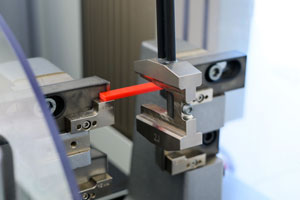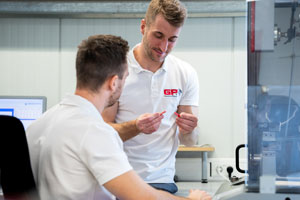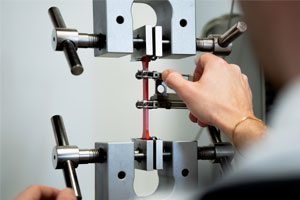MECHANICAL TESTING
Mechanical testing encompasses a wide range of procedures used to determine the mechanical properties of a plastic material or final product.
To verify compliance with regulations and quality standards – and to determine actual mechanical parameters – we offer a comprehensive portfolio of mechanical test methods. We perform testing on specimens prepared from finished parts and components as well as on raw materials.
You may conveniently send the samples to us. If required, we will extract the necessary test specimens mechanically from your product or produce them using injection molding from your granulate.
In our DIN EN ISO/IEC 17025 accredited plastics laboratory, we offer the following mechanical tests:
- Impact resistance
- Notched impact resistance
- Charpy impact bending test
- Izod impact bending test
- Dynstat impact bending test
- Determination of tensile properties and tensile modulus
- Determination of flexural properties and flexural modulus
- Pull-out forces (e.g. for plastic–metal connections)
- Shore hardness (A and D)
- Ball indentation hardness
- Drop-ball impact test
We are your point of contact
You would like to request a test or obtain technical consultation? Feel free to contact us.





Mechanical Testing of Plastics
Plastics are used across numerous industries: automotive, medical technology, consumer goods, construction, and more. Plastic components must meet defined mechanical performance characteristics to ensure product reliability. We verify these properties in our modern testing laboratory in accordance with your requirements and relevant standards. Efficient, straightforward, and precise. We offer the following standardized – and many additional – mechanical tests:
- DIN EN ISO 527: Determination of tensile properties
- DIN EN ISO 527-1: Determination of tensile properties – Part 1: General principles
- DIN EN ISO 527-2: Determination of tensile properties – Part 2: Test conditions for moulding and extrusion plastics
- DIN EN ISO 527-3: Determination of tensile properties – Part 3: Test conditions for films and sheets
- DIN EN ISO 178: Determination of flexural properties
- DIN EN ISO 179-1: Determination of Charpy impact properties – Part 1: Non-instrumented impact test
- DIN EN ISO 179-1/1eU: Charpy testing at +23 °C and sub-zero temperatures (unnotched)
- DIN EN ISO 179-1/1eA: Charpy testing at +23 °C and sub-zero temperatures (notched)
- DIN EN ISO 180: Determination of Izod impact strength
- DIN 53435: Bending test and impact test on dynstat test specimens
- DIN 53504: Determination of tensile strength at break, tensile stress at yield, elongation at break and stress values in a tensile test
- DIN EN ISO 2039-1: Determination of hardness – Part 1: Ball indentation method
- DIN EN ISO 20567-1: Determination of stone-chip resistance of coatings – Part 1: Multi-impact testing
- DIN ISO 815: Determination of compression set – Part 1: At ambient or elevated temperatures
- DIN EN ISO 1856: Determination of compression set
- DIN ISO 48-2: Determination of hardness – Part 2: Hardness between 10 IRHD and 100 IRHD
- DIN ISO 48-4: Determination of hardness – Part 4: Indentation hardness by durometer method (Shore hardness)
- DIN EN ISO 868: Determination of indentation hardness by means of a durometer (Shore hardness)
- ISO 34: Determination of tear strength
- ISO 37: Determination of tensile stress-strain properties
- VW PV 3905: Ball-Drop Test
- VW PV 3989: Ball-Drop Test
- VW PV 3966: Stress Whitening Behavior (Ball-Drop Test)
After performing these tests, the specimen or component is no longer reusable – for example in Charpy impact test (DIN EN ISO 179-1), Izod impact test (DIN EN ISO 180), Dynstat bending/impact test (DIN 53435), 3-point bending test (DIN EN ISO 178), Tensile test (DIN EN ISO 527) and other mechanical examinations.
The purpose of such testing is to evaluate the component or material thoroughly. We help answer questions regarding properties, behavior, and structural performance of your materials or components.
We provide standardized mechanical testing as well as customized test procedures tailored to individual requirements. We look forward to your inquiry regarding mechanical testing of plastics.
